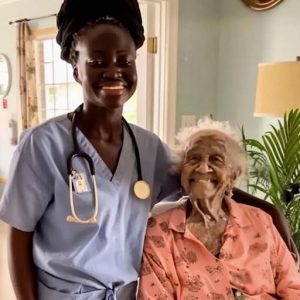A story circulating online centers on a young woman from a disadvantaged background who married a man reportedly aged around 70. What has drawn attention isn’t just the striking age difference, but the context: a union that emerged out of survival, connection and need as much as romance. In this case, the woman’s economic circumstances and the man’s senior status combine to challenge conventional ideas about love, autonomy and power.
The relationship reportedly began between two people from very different walks of life and deepened beyond expectation. Their backgrounds, stages of life and social positions were vastly different, yet they found companionship in each other. When they married, their respective communities were surprised or even unsettled by the unconventional pairing, prompting a wave of commentary across social‑media platforms. Some users expressed curiosity, others concern — and still others support.
Supporters of the couple highlight the idea that love transcends age and context. For them, companionship and emotional support matter more than conventional social norms. They argue that if both parties are consenting adults, then the relationship is valid and even inspiring. On the other hand, critics raise serious questions: the large age gap, combined with one partner’s disadvantaged background, may imply an imbalance of power, influence or choice. Is this a genuine partnership — or a relationship shaped by need, dependency and unequal negotiation?
Beyond the individual story, the tale has sparked broader conversations about agency, economic disparity and how people navigate relationships when options are limited. It forces us to ask: What role do social structures play when a person from a vulnerable position chooses a partner very much their senior? Regardless of whether this specific relationship is judged positively or negatively, it serves as a reminder that human connection often lies in complexity.
The story invites us not only to challenge assumptions about love and age but also to reflect on dignity, consent and the social conditions under which people make life‑changing decisions.




